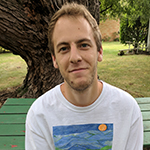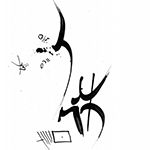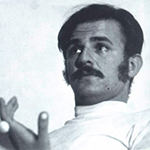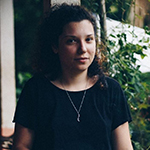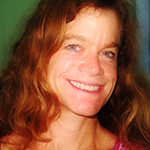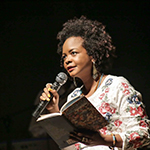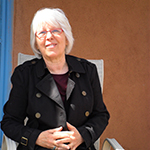the reunion
My mother had disinherited me, that’s the word she used. However she forgave me and came to my rescue upon learning of my return to Chile and reading in the newspaper what had happened to me. And she wasn’t repulsed when she saw me and realized that…
I had vague memories, not especially tender or good, of my mother. Her indifferent, or simple-minded, apathetic face. The rolls of fat on her back, her short legs. So surprised when she saw my bruised cheek (despite the thick layer of foundation that I had applied), but at least she didn’t notice my “new hairstyle,” outlandish bangs covering the left side of my face, a plastered down lock of hair covering my temple: a ruse. One of many.
“What happened to you?” Blinking with those hideous eyelashes. No matter how often she saw me sharpening a spoon to curl my eyelashes in front of the bathroom mirror, nothing; no matter how much I would attempt to communicate to her, “don’t let yourself go, Mom,” nothing.
However, now comes a sweet moment, an image that has unwittingly resurfaced. We were traveling in our car, on a drive, a picnic, my brother and me in the back seat. My dad drove and my mom, the co-pilot, had her arm stretched out behind my dad’s seat, her palm on the driver’s headrest. My dad driving and my mom holding the back of the headrest in her hand, as if supporting my father’s actual head. A family, a feeling of warmth, inclusion, protection. That is the image I now treasure. A legacy.
My mother is here. Her face is all weepy, glistening tears welling up in her eyes. Some droplets remain trapped in those thick and stubby eyelashes. “Daughter, how has this happened? You could have been killed. What is that wound you have over there? What ever happened to that guy you said you loved? And Eduarda? What happened to her? Such a pretty girl, my God, I remember that red dress, the spitting image of Raquel Welch. I don’t know what it is to be beautiful, I never had to please anybody. But you, both of you. It’s true that you resemble each other, you look so much alike, what happened? We have to look for the best doctor and we have to take steps, Conce. Maybe it’s for the best to no longer be so beautiful and to not have to satisfy anyone.”
I listen to my mother and I am a petal, I am a bird, I am very fragile and I cry heedlessly. Her tenderness hurts my soul and I take note of her “we have to.” It is my mother who includes me in this healing project, and I remember that lovely breeze, like in a movie, the drive, the picnic, and my mother’s left arm stretching out to rest her palm on my father’s curious seat cushion. Her “we have to” is similar to the arm that included us all.
“Daughter, what illness are you suffering from? What did they say?”
I cannot listen to that “daughter, daughter” which splits my soul and makes me cry even more, a profound sadness, from deep in my gut. “Daughter, daughter,” stabs that pierce me and knock me down.
“Daughter, you cannot imagine how much I have cried. There is a plague here, everything is falling apart. You don’t know it, but we have been helping here, we have to.”
My mother’s words bring solace, but at the same time they wound me, I cannot begin to fathom why.
“Do you understand me, daughter? You weren’t here and I had to do something, I was going to come unglued if I didn’t direct my energy to helping others. We mothers have stuck together. Waiting for our children, the missing, the drug addicts, the dying. And you? What about you, my love?”
I am lying on a gurney, on a mat; my mother and I are now together in the middle of a wasteland, or deep in a forest, it is a beautiful scenario, impossible. The bed has penetrated the forest, it has made its way among the trees and there is a white rectangle that stands out; dark trunks, almost black, cylinders that confine us; we are at the edge of a beach, the waves dodge our silhouettes as they approach; they pass us by, profiling our bodies; I see that my mother and I have defined contours. On the sand, lying on some towels. My mother is beside me, nearly stooped over, in a solicitous posture, ready to assist me, bent over to attend to me, and I am stretched out, I have been resting here for a long time.
“And you, dear?” repeats my mother.
I tell her after all this time. “I had a husband, yes, I did. I registered to study French… a teacher… But he wanted kids… I no longer could. Then those transfusions. And now this illness…”
I cry when I speak the word “kids.” No one understands this pain and I want something to drink, I need to take my pills. My mom knits, between her fingers a garment begins to take shape; there is a tangle of pink yarn covering her knuckles; I see a needle. She also has a sewing basket where she sometimes places her hand and, from it, she extracts a thimble, a needle. How sad, the pink yarn that may transform into a vest for a little girl, but I am not going to have any little girls, that I know… Or is it that my mother is thinking of a solution? But that’s impossible, I have nothing inside me. The others have perceived it. I understood as much when my mother and I crossed the square. I saw a group of grandmothers blowing soap bubbles into the air. The children watched them, they were learning. I passed by and I understood that they were looking at me as if I were nothing. And they were right; I was nothing. At another time I would have crossed the park, smug and disdainful, smiling to myself, you can’t imagine how much they paid me.
Not then.
Not now.
My mother knits, patient. She wants me to take my time and she needs me to transform what has occurred into a narrative. “Yes, Mom, this illness,” I resume. “It’s been worse than you can possibly imagine and I am grateful to be alive.”
“And Eduarda? What happened to Eduarda?”
I don’t know how to explain what happened, I cannot find the words and, in reality, I am terrified to tell her. I murmur a fragmented episode, because it is impossible to find a straight line in all of this. After losing the notion of time, of space, after spending who knows how many centuries in a basement with its own climate and changing my clothes a thousand times, after crossing an ocean and feeling that time will never be the same, there is little that I can articulate. I am a woman in the world, I have no country, I have no anchor, save my own blood. Eduarda? She said, “Do you think that I would fix myself up for that loser? This effort is for other men, for someone who might transform my life.” I laughed, but he looked at us with pity. And that was good, because if compassion and pity are extreme, then they might not blame you. Eduarda laughed too, saying that she was happy because she had started her “period,” in quotation marks, as she put it, as if it were a stupid term. And she concluded, triumphant, defiant, “Women are born to bleed, I bet you agree with that, don’t you?”
But of course there is a line. Follow the yellow line! My head down and my small fingers instantly enormous, as if I had taken LSD. Then in that place of horror. How to face up to that, there is no dress rehearsal, there is no Operation D.E.I.S.Y*, to prepare one for that. Operation “Daisy,” as we called it, and an undercover voice in the mouthpiece commanding, “Obey!”
The bogus call from some classmate absent from school that day, centuries before cell phones. Back then impossible to trace a number. An exciting game that we finally got accustomed to, even after the earthquake of ’85, an opportunity to miss classes, to hear another type of breathing among schoolmates, a distant scenario where you could even discern a slight terror in one eye or another. But for us there was no danger in the possibility of a tremor. We would not die in an earthquake, that was clear. St. Mary’s: the best education, high-quality facility. Ready to confront the highest number on the Richter scale. That’s what I thought when: “Follow the yellow line!” I wonder whether anyone, anywhere teaches about how to deal with the eventuality: Follow the yellow line?
What happened to Eduarda? What happened to Eduarda?
Sometimes I am able to see more. The pool of black ink: a lacquered table, a leather armchair, a cone of a light. No, not that last one. Your damp hair, your skull, my love, your head hidden, you do not want me to see your face, your eyes. I do not wish to see your face. What would happen if I should recognize your eyes? And the blood so bright, so red, maybe it’s artificial, hopefully it is, it was; fake blood, theater prop blood and that leg, a mannequin. I approach the glass table and the reflection is not my face, but hers, I swear to them. I cannot see your eyes, I think there are flies. Just a few flies, not many. It’s good that there aren’t many. But you resist turning your face, you don’t want me to see you. Then I understand that the worst has begun to occur.
My mother is still knitting. She asks me if I remember my first menstruation, when she went to look for me at school and I seemed extremely embarrassed, I didn’t want anybody to know what had happened and I made her promise me, I made her swear that this was a secret she would never reveal. She says that this day is etched in her memory. Me with my school sweatpants, hiding among the bushes at the entrance of St. Mary’s, near the gates, praying that no one would spot me, my sweatshirt tied around my waist, the sleeves hanging, and mortified from discovering the reddened fabric.
I don’t understand why my mother recounts that episode. My recollection is of having been with Eduarda, at her house, and everything was summarized in two words: “Thank goodness.” That was the key that marked the rite of passage. That and not my mother’s story. “Thank goodness,” that was the reaction of my friend/sister who had a hard time understanding me. However, days after that, “thank goodness” was a pet phrase that we were rolling around our tongues, accompanied by coughing, half-closed eyes and explosions of laughter. I smile recalling that day. My mother seems happy when she sees me smile. Conce, you have beautiful teeth, is what her smile says.
So many times, so many people. Many variations:
“Pretty teeth, natural.”
“A spontaneous smile.”
“Your teeth are so even!”
“I love it when you laugh.”
And more degrading, like that saying about the horse:
“Conce, what would you be without your teeth?”
What fury. How would it be to elevate myself, surpass those heels, a sword, the sharpest one in this city. To elongate the muscles in my arms, drawing circles in the air, to strike the fatal blow. To decapitate one after another, one head after another rolling on the floor. Eyes. Looking everywhere in search of those eyeballs. Unable to follow their trajectory, a film, and watching the horror with authentic shock, then with condemnation, finally with resignation. Murmuring, almost spitting out a couple of reproaches, and concluding: they had it coming. How could they think that nobody would punish them? Somebody has to pay. Justice for sins: someone.
“Mom, what happened to Dad?” I ask, craning my neck so that she understands that I am making an extra effort and that the question is not intended to offend her or to make her feel uncomfortable. This is a unique moment, I doubt that it will be repeated in this life. I need her to tell me, and even when she has no response, I need to try to find an explanation. However it is I who speaks: “Eduarda… crazy for the guys. I just think I remember it, so maybe my recollection is not even true. Yes, the same, the two of us. So similar. Crazy about that man who treated me like shit. High, I wanted to escape my body, to stop feeling it. At that time I was nothing, only what he saw. Whatever his eyes registered, that was who I was. But I felt a kind of cowardice and discomfort to notice the smell of the perspiration under my arms, and I tried not to raise them. It was sad to know that behind or beneath the perfume sprayed around my head was a poor camouflage, unsuccessful in masking the stink that emanated from my armpits. Terrified, thinking about how to prevent him from smelling me and then punishing me. He alone could dispense the appropriate punishment. Never ridicule him, because a man’s shame is the most dangerous; it is instantly converted into rage, transmuted into the need to inflict even more hurt, and in an irrevocable manner. They say that it is one’s own father for whom one looks. Hopefully it will be like that; hopefully I will find him.”
My mom says, “I’m sure that some day you will find him.”
Her response worries me because it reminds me of the past, years earlier, when I learned that when my mother said “I’m sure” it meant that she doubted, but that she had hope. A line crosses her eyes and like a reflex her lips synchronize with them. My mother remembers, with joyful longing, “It was a pretty day, that afternoon, when you went to the movies with your friends and you called me on the phone. You didn’t want to say what had occurred. I looked for you at the movie theater exit and you approached me, practically running. And crying. In the movie, you said, they had offered you some sanitary napkins. But you were a hopeless mess. Disconsolate, you left the dark theater to look for a pay phone, saying that you wanted to go home, that they shouldn’t worry. You managed to tell your friends that you would call them and that you wanted to know how the movie ended. But to me you insisted, ‘I don’t want anybody to know.’ Remember? I clearly recall that we stopped at a pharmacy and that I bought you some of those new disposable sanitary napkins. I felt so happy, I don’t know, almost proud, to be able to buy the latest thing for you, and also grateful, inside, that you didn’t have to use those infernal belts that we used when we were girls, to hold the napkin in place. How wonderful, an adhesive strip solved this tremendous problem. And when we got home you locked yourself in the bathroom, and then emerged, my beautiful, bleeding girl, yes, my anguished girl. And then I felt my heart break a little bit, desolation and a kind of vanity at the same time, because I knew that your childhood was gone forever. And, do you see, Conce? I kept your secret. I kept it.”
Thank goodness!
There is sadness in those eyes. And in mine, like holes in the sand and the water draining into them. We have to get up and get out of here soon. Before the tide comes up we have to escape. Yes, the water has approached, threatening to soak us. That is to say, the darkness has already descended on this forest; the edges of the sheets have darkened, the bed is barely visible among the darkening trunks. My mother says that she is going to take care of me from now on. She is going to heal and pamper me, she says. We’re going to take care of each other and she is going to be responsible for my well-being. She takes me by the arm, I stand up, summoning an external strength, and I shake off the sand. The moist crystals glisten, they are stones, quartz, pulverized glass. I slap them from my skin, like a macabre mermaid shedding scales. We walk on the particles like two zombies in an apocalyptic horror movie. From my hair my mother takes some eucalyptus leaves and fine green needles that the spruce trees have sprinkled on my head. It doesn’t take long to reach the street and my mother opens the door to her house and makes me enter. I feel sad and kind of embarrassed when my mother sees me dialing numbers on my phone, and she gently reproaches me, “Why are you ordering a pizza if I’m preparing rice and getting ready to bake a chicken breast?”
Like a historian, searching for a faithful account… Our paths have crossed. It’s one of those confusing moments in which I don’t know where I am and thus the past falls on me in the form of ancestors. But why does it have to be surprising or unexpected if the past has always been there? Our origins… A secret? I must sniff around. The need to investigate, to endow this insipid present with meaning. Those ancestors are all I have in order to endure what happens now, otherwise the only solution would be suicide. And no, I cannot follow you there, Eduarda.
The voice of the
detective with the hawk-eyes whispers, “Does God know?
* an emergency drill
translator’s note:
The Reunion is a chapter from Concepciones, a novel published by Furtiva Editorial in 2017. The excerpt offers us a look at the complex relationship between a damaged young woman and her mother. As with much Chilean fiction, the story is set against the background of the Pinochet dictatorship, which had such a profound effect on all who lived through it. We get a glimpse of how reality is sometimes an individual’s invention, with memories either warped or fabricated. As a result of the trauma the two women experienced living through the Pinochet years, they now struggle with their conflicting memories as they try to find a way to move forward together.

Claire Hirsch is a graduate of Tufts University. She has translated several pieces of fiction, specializing in Chilean narrative. Along with the author, she tackled the translation of the avant-garde novel, No Me Ignores, which received critical acclaim in Chile (Publishing House Cuarto Propio). She also collaborated with the author on the bilingual translation of En La Isla/On The Island. Previous translations by Ms. Hirsch have been published in K1N Journal of Literary Translation (Canada) and The Stinging Fly (Ireland).
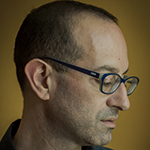
Nicolás Poblete Pardo lives in Santiago de Chile. He is a full-time professor at the Universidad Chileno-Británica de Cultura, as well as Coordinator of the Cultural Studies Area. Dr. Poblete has published numerous novels and short story collections. Additionally he frequently contributes La Panera, a cultural magazine, and the journal cineyliteratura.cl as a part of his very productive career. Dr. Poblete received his Masters and PhD from Washington University in St. Louis, where he also did a post-doctoral research project on the Latin American Gothic novel. He has received a number of honors and awards, including fellowships for his writing as well as teaching awards.

 BACK TO ISSUE
BACK TO ISSUE